
Annual Review of Cancer Biology
Scope & Guideline
Exploring the Complexities of Cancer Science
Introduction
Aims and Scopes
- Molecular Mechanisms of Cancer:
The journal emphasizes the exploration of molecular pathways and genetic alterations that drive cancer development and progression. This includes studies on oncogenes, tumor suppressor genes, and signaling pathways. - Innovative Therapeutics and Treatment Strategies:
A core focus is on the discovery and evaluation of novel therapeutic approaches, including targeted therapies, immunotherapies, and combination treatments that enhance efficacy against various cancer types. - Cancer Microenvironment and Metabolism:
Research on the interplay between cancer cells and their surrounding microenvironment, as well as metabolic reprogramming in tumors, is a significant area of interest, highlighting how these factors influence tumor behavior and therapeutic responses. - Genomic and Epigenomic Profiling:
The journal covers advancements in genomic and epigenomic profiling techniques that provide insights into the heterogeneity of tumors and can inform personalized medicine approaches. - Clinical Applications and Translational Research:
There is a strong emphasis on translating laboratory findings into clinical applications, including the development of biomarkers for diagnosis and prognosis, as well as strategies for improving patient outcomes.
Trending and Emerging
- Immunotherapy and Immune Modulation:
There is a notable increase in research related to immunotherapy, including CAR T-cell therapies and checkpoint inhibitors, reflecting a growing interest in harnessing the immune system to combat cancer. - Epigenetics and Cancer:
The exploration of epigenetic mechanisms and their role in cancer biology is on the rise, with studies focusing on histone modifications and the implications for therapy, indicating a deeper understanding of gene regulation in cancer. - Metabolic Reprogramming:
Recent papers emphasize the role of altered metabolism in cancer progression and therapy resistance, highlighting the importance of understanding metabolic pathways as potential therapeutic targets. - Digital Pathology and Computational Approaches:
The application of digital pathology, AI, and machine learning in cancer diagnosis and treatment is increasingly relevant, showcasing the integration of technology in cancer research. - Microbiome and Cancer Interactions:
Emerging research is focusing on the relationship between the microbiome and cancer, particularly how gut microbiota can influence therapeutic responses, which opens new avenues for personalized treatment strategies.
Declining or Waning
- Traditional Chemotherapy Approaches:
There appears to be a waning interest in discussing traditional chemotherapy alone, as the field increasingly emphasizes targeted and personalized therapies that aim to mitigate the limitations of conventional treatments. - Single-Agent Therapies:
The publication of papers focusing solely on single-agent therapeutic strategies has decreased, indicating a shift towards exploring combination therapies that enhance efficacy and reduce resistance. - Basic Research on Established Cancer Types:
There is a decline in focus on well-established cancer types like breast and prostate cancer in favor of emerging areas such as rare cancers or those with unique biological characteristics. - Non-targeted Radiation Therapies:
Research focused on conventional radiation therapy techniques is diminishing, as novel approaches like FLASH radiotherapy and combination strategies with immunotherapy gain prominence.
Similar Journals
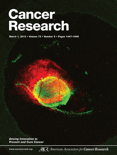
CANCER RESEARCH
Fueling the fight against cancer through rigorous research.Cancer Research, published by the American Association for Cancer Research, is a premier journal in the field of oncology, renowned for its commitment to advancing cancer research since its inception in 1941. With an impressive impact factor reflecting its vital role in the field, this journal consistently ranks in the Q1 quartile for both Cancer Research and Oncology, positioning it among the top 7.5% of journals in these categories. The journal serves as a crucial platform for researchers, professionals, and students to disseminate and gain insights into groundbreaking studies that shape our understanding of cancer biology, prevention, diagnosis, and treatment. While it is not an open-access publication, its rigorous peer-review process ensures that only high-quality research is published, thus maintaining a standard of excellence in the scientific community. With a strong legacy and an ever-expanding influence, Cancer Research continues to be essential for anyone dedicated to the fight against cancer, showcasing cutting-edge research that drives scientific discovery and innovation.

MUTATION RESEARCH-FUNDAMENTAL AND MOLECULAR MECHANISMS OF MUTAGENESIS
Bridging Theory and Experiment in Mutation ResearchMUTATION RESEARCH - FUNDAMENTAL AND MOLECULAR MECHANISMS OF MUTAGENESIS is a premier peer-reviewed journal published by Elsevier, dedicated to advancing the understanding of mutagenesis and its broader implications in genetics, health, and molecular biology. With an impressive converged publication history from 1964 to 2024, this journal provides a vital platform for the dissemination of high-quality research findings, contributing significantly to the field's knowledge base. Indexed in Scopus, it holds a Category Quartile ranking of Q3 in Genetics and Q2 in Health, Toxicology, and Mutagenesis, further underscoring its relevance and stature. Access options are available, catering to a diverse audience of researchers, professionals, and students eager to stay informed on the latest developments in mutagenesis research. By bridging experimental studies and theoretical frameworks, the journal plays a crucial role in exploring the fundamental mechanisms underlying genetic mutations and their effects on human health and the environment.

Cancers
Unleashing insights to combat cancer effectively.Cancers is a leading peer-reviewed journal published by MDPI, dedicated to advancing the field of oncology and cancer research. Established in 2009 and based in Switzerland, this Open Access journal provides a platform for the rapid dissemination of high-quality research findings, reviews, and clinical studies related to all aspects of cancer biology and treatment. With an impressive impact factor and recognized as Q1 in Oncology and Q2 in Cancer Research for 2023, Cancers strives to foster a collaborative environment among researchers, healthcare professionals, and students seeking to deepen their knowledge and understanding of cancer. The journal’s commitment to accessibility and its broad scope make it an invaluable resource for anyone passionate about combating cancer and improving patient outcomes. For more information and to access its diverse publications, visit the journal’s website.

CANCER AND METASTASIS REVIEWS
Elevating Knowledge in Oncology and BeyondCancer and Metastasis Reviews, published by Springer, is a leading journal in the field of oncology and cancer research. With an impressive impact factor placing it in the Q1 category for both Cancer Research and Oncology as of 2023, this journal is ranked 29th out of 404 in Medicine, Oncology, and 22nd out of 230 in Biochemistry, Genetics, and Molecular Biology, reflecting its significant influence and prestige in the academic community. Established in 1982, the journal covers a wide spectrum of topics related to the mechanisms of cancer progression and metastasis, making it an essential resource for researchers, healthcare professionals, and students dedicated to understanding and tackling cancer. Although the journal does not provide open access options, the impactful research it publishes contributes to advances in therapeutic strategies and enhances the collective knowledge surrounding cancer pathophysiology. With research converging from 1982 to 2024, Cancer and Metastasis Reviews continues to be a vital platform for disseminating high-quality scientific information in the ever-evolving landscape of cancer research.
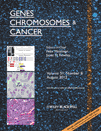
GENES CHROMOSOMES & CANCER
Unraveling the Genetic Mysteries of Cancer.GENES CHROMOSOMES & CANCER, published by Wiley, is a premier journal in the intertwined fields of cancer research and genetics. With an ISSN of 1045-2257 and an e-ISSN of 1098-2264, this journal has been a significant outlet for innovative research since its inception in 1989, continuing through to 2024. Positioned in the Q2 quartile of both Cancer Research and Genetics categories in 2023, it reflects a strong impact in the scientific community, as evidenced by its Scopus rankings—99th in Genetics and 83rd in Cancer Research. Though it does not provide open access options, GENES CHROMOSOMES & CANCER offers valuable insights that foster collaboration and discovery among researchers, professionals, and students dedicated to understanding the genetic underpinnings of cancer. With its reputable standing, this journal is a vital resource for those aspiring to contribute meaningful advancements in cancer genetics and therapeutic interventions.

Molecular Cancer
Transforming cancer knowledge into clinical practice.Molecular Cancer, published by BMC, stands as a premier open access journal dedicated to advancing our understanding of cancer biology, treatment, and prevention since its inception in 2002. With an impressive Q1 ranking in the domains of Cancer Research, Molecular Medicine, and Oncology, this journal occupies a significant position in the academic landscape, emphasizing high-quality research that influences clinical practices and future studies. The journal is indexed in leading databases with exceptional Scopus ranks, reflecting its rigorous peer-review process and impactful contributions to the field, where it ranks in the top 2-3 positions across various relevant categories. Based in the United Kingdom, Molecular Cancer offers researchers worldwide a valuable platform for disseminating innovative findings that drive the biomedical community forward. The journal's open access model ensures that groundbreaking research is freely accessible, fostering collaboration and knowledge sharing among professionals, students, and academics alike. Explore cutting-edge developments in cancer research through Molecular Cancer and join a community committed to improving patient outcomes and advancing scientific discovery.
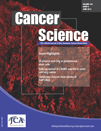
CANCER SCIENCE
Connecting researchers and clinicians to transform cancer care.Cancer Science, an esteemed journal published by Wiley, stands at the forefront of oncology research, boasting an impressive impact factor and a classification in the Q1 category for its contributions in Cancer Research, Medicine, and Oncology as of 2023. Since its inception in 2003 and transitioning to an Open Access model in 2014, the journal has facilitated global dissemination of critical research findings, ensuring that vital information remains accessible to researchers, clinicians, and students alike. With its comprehensive scope covering cutting-edge discoveries in cancer biochemistry, genetics, and molecular biology, Cancer Science is recognized for its rigorous peer-review process and significant contributions to advancing our understanding of cancer. The journal, located at 111 River St, Hoboken, NJ, is an essential resource for anyone dedicated to improving treatment outcomes and pushing the boundaries of cancer research.
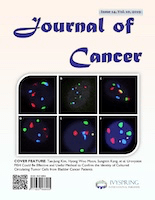
Journal of Cancer
Fostering collaboration to conquer cancer challenges.Journal of Cancer is a premier, peer-reviewed academic journal published by IVYSPRING INTERNATIONAL PUBLISHING that focuses on advancing the field of oncology. With an impact factor reflecting its significant contributions, this journal ranks in the 80th percentile of medical journals pertaining to oncology, positioning it at #79 out of 404 in Scopus. Since its inception in 2010, the journal has embraced an Open Access model, ensuring that groundbreaking research reaches a global audience without barriers. Based in Australia, the journal addresses a wide array of topics within cancer research, catering to researchers, healthcare professionals, and students committed to enhancing their understanding of the complexities of cancer. Amidst evolving challenges in oncology, the Journal of Cancer serves as a vital platform for disseminating innovative findings, fostering collaboration, and promoting informed decisions that can lead to improved cancer outcomes worldwide.
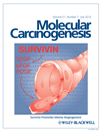
MOLECULAR CARCINOGENESIS
Decoding the Pathways of Cancer DevelopmentMOLECULAR CARCINOGENESIS is a prestigious academic journal published by Wiley, dedicated to advancing the understanding of the molecular basis of cancer. Established in 1988, this journal serves as a vital resource for researchers and professionals in the fields of cancer research and molecular biology. With an impressive impact factor reflecting its significance in the Q2 category for both Cancer Research and Molecular Biology, it stands out for its high-quality, peer-reviewed articles that explore innovative research, novel findings, and emerging trends in carcinogenesis. Although the journal currently does not offer open access options, it remains accessible to the academic community through numerous institutional subscriptions. Positioned in the United States and contributing to the global discourse on cancer research, MOLECULAR CARCINOGENESIS is an essential publication for anyone engaged in the study of cancer at the molecular level.

Cancer Cell International
Advancing the Frontiers of Cancer ResearchCancer Cell International, published by BMC, is a transformative open-access journal established in 2001, dedicated to advancing the field of oncology and cancer research. With its ISSN number not specified and an E-ISSN of 1475-2867, the journal proudly operates from the United Kingdom, located at CAMPUS, 4 Crinan St, London N1 9XW, England. Renowned for its rigorous peer-review process, Cancer Cell International has made significant strides, securing a Q2 ranking in Cancer Research and Q1 rankings in both Genetics and Oncology as of 2023. It ranks impressively in Scopus, featuring in the top quintile of Genetics (#37/347) and Oncology (#52/404), indicating its importance within the scientific community. The journal's broad scope caters to a diverse array of topics within cancer biology, making it an invaluable resource for researchers, professionals, and students seeking to stay at the forefront of cancer science. With a commitment to disseminating high-quality research, Cancer Cell International invites scholars to explore innovative findings and contribute to the collective effort of combating cancer.